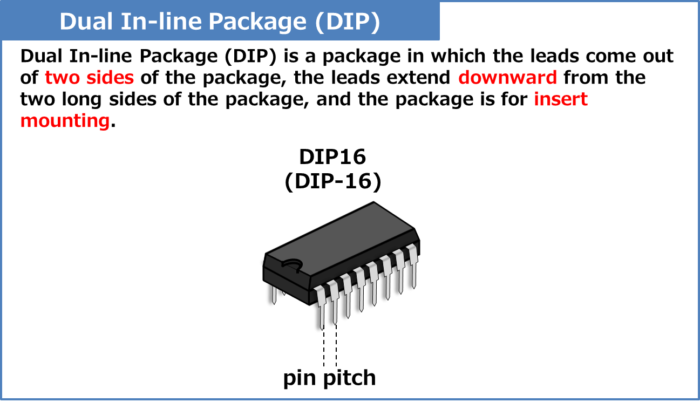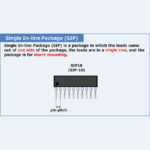There are various types of semiconductor and IC packages, such as Dual In-line Package (DIP) and SIP (Single In-line Package).
Regarding the "Dual In-line Package (DIP)", this article will explain the information below.
- Dual In-line Package (DIP) Definition
- Types of Dual In-line Package (DIP)
Dual In-line Package (DIP) Definition

DIP stands for "Dual In-line Package".
Dual In-line Package (DIP) is a package in which the leads come out of two sides of the package, the leads extend downward from the two long sides of the package, and the package is for insert mounting.
Dual In-line Package (DIP) is available in a variety of pin pitch distances. The normal pin pitch is 100 mils (2.54mm), but there are some with a pin pitch of 70 mils (1.778mm). Package widths include 600 mils (15.2mm), 400 mils (10.16mm), and 300 mils (7.62mm).
Dual In-line Package (DIP) has 6 to 64 pins.
The number after DIP indicates the number of pins. For example, DIP16 means a 16-pin DIP.
In addition, the package material, etc., changes depending on the English letter preceding the DIP.
Supplement
- A package with leads coming out of two sides of the package for insertion mounting is called a Dual In-line Package (DIP), and a package with leads coming out of one side of the package for insertion mounting is called a Single In-line Package (SIP).
- DIP is sometimes described as DIL.
- The DIP was invented in 1965 and was the mainstream IC package until the 1980s because of its suitability for mounting ICs; it is still used for general-purpose logic and other applications, although its use has declined since 1980 due to the development of surface-mount packages.
- The pin pitch of DIPs is typically 100 mils, making them easy to mount on breadboards and general-purpose boards. They can also be made removable with sockets.
Related article
The following article explains the "Single In-line Package (SIP)" in detail. If you are interested, please check it out from the link below. 続きを見る
What is Single In-line Package (SIP)?
Types of Dual In-line Package (DIP)
SDIP
The "S" in front of DIP stands for "Shrink".
Therefore, "Shrink Dual In-line Package (SDIP)" is a DIP with a shrunk pin pitch. The same concept applies to other basic packages (SOP, ZIP, PGA, etc.).
HDIP
The "H" in front of DIP stands for "with heat sink".
Therefore, "HDIP" means a "DIP with heat sink".
HSDIP
The "H" in front of HDIP stands for "with heat sink".
Therefore, "HSDIP" means a "SDIP with heat sink".
PDIP
The "P" in front of DIP stands for "with piggyback.
Therefore, "PDIP" means a "DIP with piggyback".
P-DIP
The "P-" in front of DIP stands for "plastic".
Therefore, "Plastic DIP (P-DIP)" means a "DIP whose package material is plastic".
C-DIP
The "C-" in front of DIP stands for "ceramic".
Therefore, "Ceramic DIP (C-DIP)" means a "DIP whose package material is ceramic".
G-DIP
The "G-" in front of DIP stands for "glass sealed ceramic".
Therefore, "Glass sealed ceramic DIP (G-DIP)" means a "DIP whose package material is glass sealed ceramic".
CERDIP
CERamic DIP (CERDIP) is a common name for a package in which the package body is sealed with ceramic glass.
It corresponds to "G-DIP" in the JEITA package code.
WDIP
DIP with Window package (WDIP) is a DIP with a transparent window for UV (ultraviolet) removal.
The name varies by manufacturer; STMicroelectronics calls them FDIPs.
Power DIP
Power DIP is a DIP designed to dissipate the heat generated by the IC through the lead pins.
The lead pins near the center are often grouped to form a ground (earth) terminal.
Summary
In this article, the following information on the "Dual In-line Package (DIP)" was explained.
- Dual In-line Package (DIP) Definition
- Types of Dual In-line Package (DIP)
Thank you for reading.
Related article
The packages of semiconductors (IC and transistor) other than "Dual In-line Package (DIP)" described in this article are explained in detail in the following article. If you are interested, please check it out from the link below.
- Types of IC Packages
- What is Small Outline Transistor (SOT)?
- What is Small Outline Diode (SOD)?
- What is Transistor Outline (TO)?
- What is Single In-line Package (SIP)?
- What is Zig-zag In-line Package (ZIP)?
- What is Small Outline Package (SOP)?
- What is Small Outline Non-leaded package (SON)?
- What is Small Outline J-leaded package (SOJ)?
- What is Quad Flat Package (QFP)?
- What is Quad Flat Non-leaded package (QFN)?
- What is Quad Flat J-leaded package (QFJ)?
- What is Ball Grid Array (BGA)?
- What is Land Grid Array (LGA)?
- What is Pin Grid Array (PGA)?